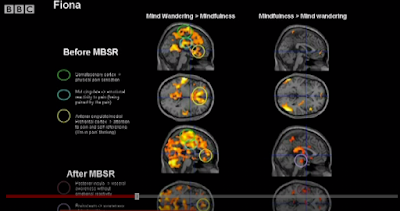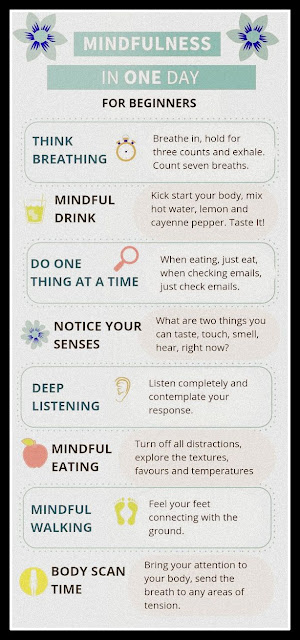Sit, breathe, watch your thoughts – the daily practice of
mindful meditation is not as simple as it seems. If done with focus, it helps
in more ways than one can imagine. For example, some patients with chronic pain
have used mindfulness to manage their suffering. Mindfulness doesn’t make the pain
go away, but it certainly makes it manageable, pushing it to a place where it
can be dealt with.
For years, scientists have used techniques to study the
effects of meditation. In an experiment done by BBC,
a patient’s MRI was conducted in which she was first asked to let her mind
wander and later meditate. The technology captured her mind waves in both the
scenario, with the right one showing significant reduction in the thoughts
during and after meditation.
This shows the physically consistent proof of the benefits of meditation. One of the major advantages of mindfulness it that it helps to reduce the ‘me bit’ of a personality. Called ego in common language, it shifts in the pristine range, thereby making it possible to act to a situation and not just react to it.
How we pay attention?
It is easy to overlook, it shapes our world. But with
digital culture, our attention spans have reduced significantly. Reaching to
our phones compulsively, checking news headlines several times a day, or
wandering off to Instagram pages – all the fuss of digital distraction is real.
Is Mindfulness Meditation Dangerous?
No, not if done with proper guidance. Research shows that
after practicing mindfulness, the grey matter in your brain's amygdala – a
region known for its role in stress – can become smaller. Mindfulness and
creativity. The pre-frontal cortex is the area of your brain responsible for
things like planning, problem-solving, and controlling your emotions.
Read More:








2 comments:
Benefits of Meditation You Must Know
The benefits of meditation are many. With sleep or morning meditation, you can maintain self-discipline, improve sleep patterns, and more.
Thanks for writing this blog, You may also like the Spiritual Health
Post a Comment